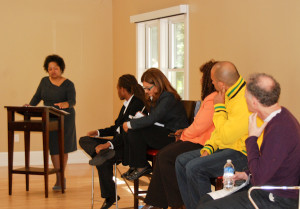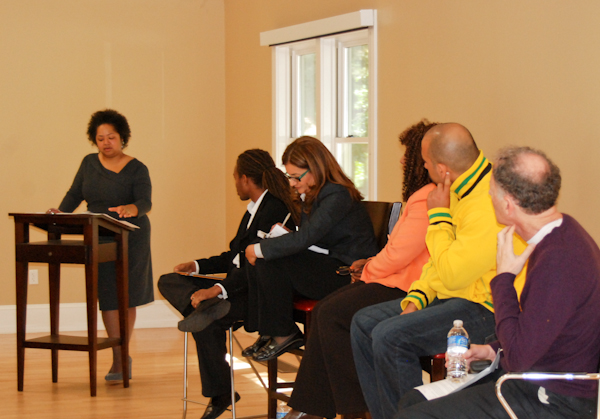“The ante has been upped emotionally for you with Trayvon Martin,” said Stanford parent and attorney Simona Farrise to an audience at the Black Community Services Center (BCSC) Friday afternoon. “We have become comfortable with police officers, under the color of the law, killing young black men — now we have gone another step and said, ‘An ordinary person who I might see in the grocery store, who has no training, no license, no right – nothing — can just shoot somebody down and it will be okay.’”
Farrise was one of five panelists brought together by the BCSC, Black Student Union (BSU) and Stanford NAACP to discuss “Justice for Trayvon.” The event focused on the legal and cultural ramifications of George Zimmerman’s February killing of Trayvon Martin, an unarmed black 17-year old, allegedly in self-defense.

Zimmerman has yet to be arrested or formally charged.
Jan Barker-Alexander, associate dean of students and BCSC director, began moderating the event by explaining how a student had approached her shortly before spring break, upset over Martin’s killing and feeling unable to discuss the case with friends.
“We were looking at this from research, policy, practice and passion,” Barker-Alexander said about organizing a discussion that would also allow the community to reflect emotionally on the case.
Mark Kelman, Stanford Law School professor and vice dean, stated that he didn’t think Florida’s “stand your ground” laws, which allow residents to use lethal force if they feel they are in danger, applied to this case.
“The ‘stand your ground’ law only comes into play when you are already entitled to use deadly force,” Kelman said, asserting that individuals must make an attempt to retreat before they are entitled to use deadly force against an alleged attacker.
“It upsets the role of law enforcement,” Farrise added, noting that, while California has self-defense laws, police are still allowed to make arrests and district attorneys are allowed to initiate charges if it looks like a crime has been committed. By contrast, Florida law precludes legal action.
Pamela Price, an Oakland-based civil rights attorney, then speculated whether “stand your ground” would have been accepted had Martin and Zimmerman’s races been reversed.
“The police did not do a proper investigation because somebody made the decision early on that this law was available to Mr. Zimmerman,” Price said. “Would it have been available to Trayvon? I seriously doubt it.”
Price also asserted that Martin’s killing reflects larger issues involving race.
“For some there is still very much a perspective of white privilege,” she said. “‘You are not a white child, you are a black child in a hoodie and you look suspicious to me, so therefore I have the right to follow you…and you have no rights from my perspective.’”
Samy Alim M.A. ‘02 Ph.D. ‘03, School of Education professor and director of the Institute for Diversity in the Arts, commented on this presumed privilege, discussing a blog post he wrote about being viewed as suspicious by a white couple while walking home in his Mountain View neighborhood.
“I was afraid of the consequences,” Alim said. “If someone fears me that much just walking home, what might happen? Will they call the police?”
Ajani Husbands ‘05 then discussed “the talk” that black parents have with their children — particularly males — about how to act and interact outside the home.
Husbands said his mother gave him “the talk” a number of times, but its meaning did not “hit home” until Trayvon Martin’s death.
“I realized that ‘the talk’ is not necessarily ‘study extra hard, be extra diligent in your studies,’ it’s ‘be extra careful because you can and possibly will die at any moment for anything.’ It doesn’t matter how good you are, how well you’re dressed — at any moment, you can be a victim,” Husbands said.
Martin’s killing inspired Husbands to write “An Open Letter to My Unborn Black Son,” in which he gave his own version of the talk to his unborn son.
Husbands said that people from around the world want to see how the Constitution will be reconciled with the reality of what happens on the streets.
The panel concluded with members warning students about “the acquiescence of self,” advising them not to be silent about issues of race for fear of making friends feel uncomfortable.
“You must communicate,” Farisse said.
An estimated 100 students total attended some part of the event, and a Q&A session lasted nearly 40 minutes after the panel concluded.
“My biggest takeaway would be to have courage, to voice your opinions and to not be afraid to speak out against these injustices,” said Milton Achelpohl ‘13, vice president of the Stanford NAACP. “That’s the only way that the unfortunately long list of cases like this will be addressed, when there’s a collective conversation that leads to a collective responsibility.”
BSU president Anna Asare ‘14 said that it was important for her to see the breadth of legal issues surrounding Zimmerman’s treatment.
Achelpohl and Asare added, that beyond hosting “Hoodies and Hijabs, “a rally against racial discrimination tomorrow, the NAACP, BSU and other student groups will mobilize students to call and write politicians demanding legal action.
